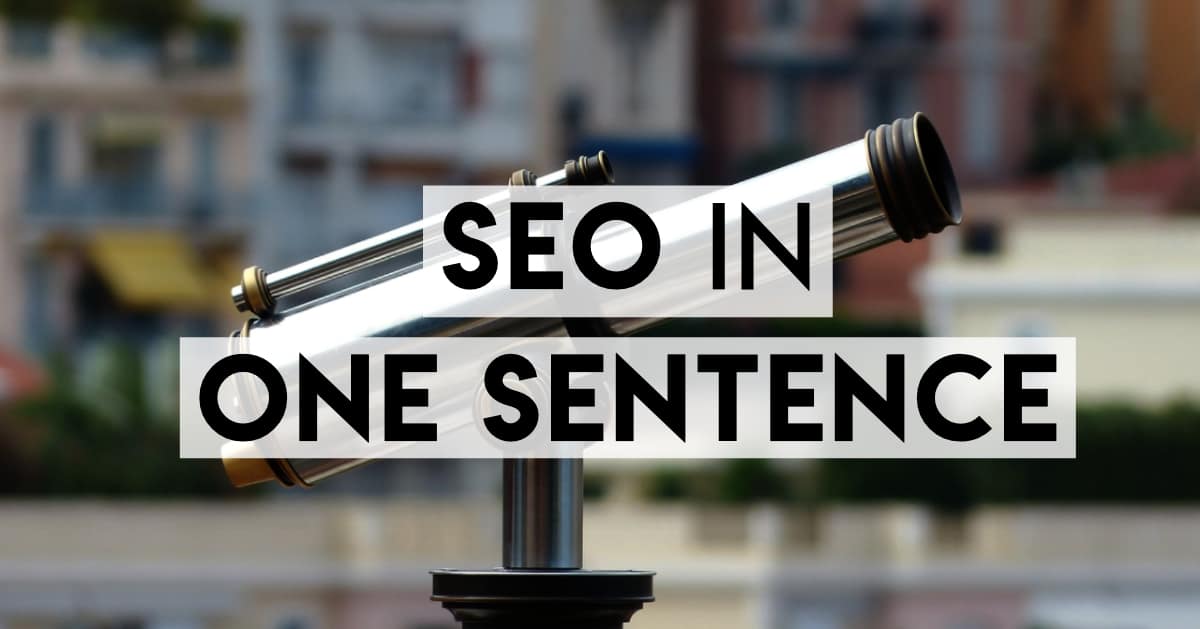There are lots of people out there selling "search engine optimisation" snake oil. They say "SEO doesn't have to be hard" and sell you a big book of how to do it "easily", with a ton of products, courses, or expensive consulting fees you should buy.
But SEO is really quite easy: it's about thinking and communicating like a human.
In this guide...
- SEO in one sentence
- Why the sentence holds true
- Your website has to be fast, so people wait for it to load
- Your website has to be attractive, so people keep using it
- The content has to be interesting and relevant
This article originally appeared on Hooshmand.net.
SEO in One Sentence
SEO, in one short sentence, is as follows:
"A search engine-optimised website is fast, attractive, and rich in relevant, interesting content."
This is true whether you're talking about search-engine optimisation for a website, a video, an app, or a podcast. But here, we'll focus mostly on websites.
Why is This True? (An Intro to How Search Engines Think)
Search engines try to show you content that is most likely to please you.
Search engines try to think like a person. What would a person want? If a person Googles "calories in one egg", what do they most want to see? A huge article studying the calories in eggs, a Wikipedia entry about eggs, or just a number?
Of course, the answer may sound obvious to you, but Google is not a person. And, by the way, you're not like every person. What you want isn't necessarily what everyone wants. Some people might just want a number, but some might want the other options. So, to predict what to show people, Google has to watch everyone to see what they like.
Google watches:
- What people type into Google
- Which of their results their mouse hovers over
- Which result(s) they click on
- What they do on the website they end up on — how long they stay (or whether they close it instantly) and whether they keep clicking around.
All of these things people do are potential "signals" that can tell Google: "This website is relevant for this search term. Put it higher to the top, so more people see it."
Other search engines work similarly — though none are as advanced as Google.
The closer your website is to the top of search results, the more likely it is someone will click on it, read it, share it, comment on it, and rate it. This means more traffic for you.
Let's break down the elements of an SEO: Speed, Attractiveness, and Relevance.
Speed: A Search Engine-Optimised Website is Fast

Ever tried to load a website, but gotten so frustrated with how slowly it loaded that you shut it down and went and did something else?
This is what you're trying to avoid.
Google has explicitly said that site speed is an important ranking factor. But how fast is fast enough?

Generally speaking, a website has to load and be interactive within two seconds. This is somewhat anecdotal, and somewhat based on studies. Not just on your fast American desktop connection. The same has to be true on mobile, in some random other country!
There are lots of ways of making a fast website, but it starts with
- A fast host (server). You either have a blazing fast server and a CDN service, or you deploy a static site directly to the CDN (like in the JAMstack).
- A fast website platform.
- Light content — optimised photos, few scripts
And remember, your website has to be fast on mobile, too — not just on the desktop.
Attractiveness: An Search Engine-Optimised Website Looks Good

An SEO-optimised website has to be nice to look at. Users don't stick around ugly websites.
Recall that Google watches to see if users stick around on a website. If your website is unattractive or hard to navigate, then users will leave, and that sends a signal to Google: "Hey, people don't like this. Don't show it ot them."
An SEO-optimised website has to be easy to consume. For users to read your website, the navigation and layout have to really work.
Finally, an SEO-optimised website has to not be annoying. Pop-ups, distracting banners, heavy advertising... these all make the user experience worse. The worse the user experience, the more likely they will leave.
An Search Engine-Optimised Website is Rich in Relevant, Interesting Content

Content has to be relevant in two ways: both to the consumer, and to the business.
Firslty, content has to be interesting to the consumer. They've got to want to read it until the end.
For example, if someone is searching for a buyer's guide for Ducati Monsters, then they want to get all the information they need, and nothing more. And definitely not less.
The goal for every page published has to be for readers to say "that is EXACTLY what I wanted to read" and for them to write or comment saying "thank you!"
Secondly, content has to be relevant to you, something you can discuss because you're an expert, or that relates to products you sell.

A good example of relevant, interesting content is Ambronite blog. Ambronite is a meal replacement product that was created for people who were hungry, short on time, but wanted a better option than pizza and coke. Because their focus is on promoting a healthy lifestyle, it makes sense for them to blog about health and diet.
When someone finds your website and it turns out you both have answers AND are an expert, then they'll keep reading.
If, however, you're just some random person... they'll move on. You can of course build up authority over time, like I have with motorcycles, but that takes time.

